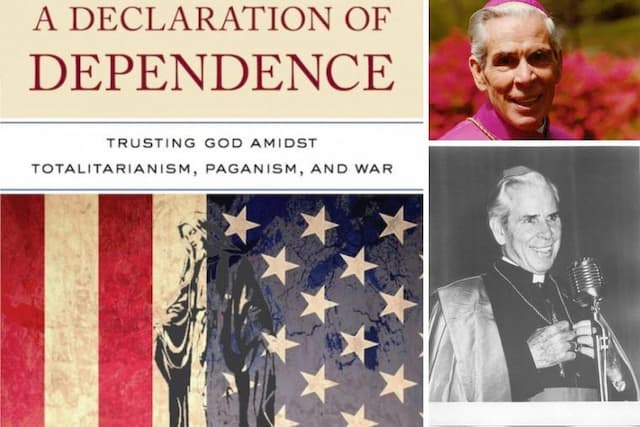What Have You Got to Do With Me? - Lin Wilder

What have you got to do with me?
“…Catching sight of Jesus from a distance,
he ran up and prostrated himself before him,
crying out in a loud voice,
“What have you to do with me, Jesus, Son of the Most High God?”
It’s a very strange Gospel passage: The one for this past Monday in the Christian liturgy. Jesus and His disciples have traveled to the Decapolis. Although I’ve heard it countless times since I’ve been in the faith, this time, the reading sticks with me days later. There are a number of reasons I find this passage memorable. But primarily these:
- The Lord travels to a primarily Gentile region, Garasenes.
- The man lives in the tombs and is exiled by everyone. But,
- Instantly the man possessed by a “legion” of demons prostrates himself before the Lord, calling Him, Jesus, Son of the Most High God.
- And our Lord ‘obeys’ the Demons’ plea to let them inhabit the herd of 2000 plus pigs.
- The formerly exiled and tormented man becomes the first Gentile evangelist.
How can we help being struck by the response of demons to Jesus?
The man doesn’t answer Jesus’s question because he can’t.
It’s worth a repeat, Legion, [Read the entire Gospel reading here] recognizes just Who This is and prostrates himself before Him and addresses Him as “Son of the Most High.”
While the scribes, rabbis, and the priests mock, criticize, then concoct an elaborate plot to ensure Pilate’s submission to kill Christ, the demons know. They know because they are angels, fallen ones to be sure, but with powers and knowledge far beyond our own.
What is Legion, the name given to Jesus when He asks?
A Roman legion numbered between 6000 soldiers along with a number of calvary—and legion is also the name of satan and his followers. Since Jesus answers Legion’s bidding, we know there were over 2000 of them because the Lord drove them into the herd of over 2000 pigs.
Is this way too outlandish a story to believe?
Demons?
Come on.
If you’ve been reading my articles for a while, you may have noticed that I’m a fan of Eric Barker.
Why?
He’s funny and timely. More importantly, it doesn’t require a humungous stretch to apply his thoughts to my primary interest: friendship with God. Barker’s latest piece is on the problem of distraction and productivity. Rhetorically, Barker asks, “Who is best suited to teach us about productivity?”
And answers, “Monks.”
Abba Poemen, a leader at the monastic community of Scetis, said, “the chief of all wickednesses is the wandering of the thoughts.” Monks would space out during prayer or even when officiating mass. (This might sound like a Monty Python skit waiting to happen but the Middle Ages weren’t as different from modern times as you think – I hear they dealt with a pretty bad plague, too.)
Believe it or not, monks were the productivity gurus of their era, always looking for a better way to focus and get things done. They saw themselves as athletes and warriors of the mind. And what did they find was the primary cause of mind wandering?
Demons.
Barker isn’t about to admit what we can see with our own eyes: demons are no convenient fabrication of an eighth-century-monk. We can see after school satan clubs being allowed in elementary schools. The rising number of people being drawn to the newly revised satanism reveals the frightful cleverness of the deceiver.
Although Eric Barker knows that talking about satan as real doesn’t get you on the bestseller list, ever so lightly, he suggests there may be truth in what the monks believed. His openness is one of the many reasons I enjoy reading his thoughts.
Announce what the Lord out of pity has done for you.
Until I read his article, I’d not thought of my prayer as “productivity.” Or that my focus—or lack of it, matters to the salvation of the world. Perhaps without knowing it, Barker provides us with a map for prayer. He’s even included the need to fogive ourselves when we don’t measure up.
A necessary reminder for me, because constantly, I mean all the time, I’m flattened by my inconsistency, laziness and distractions while in prayer. Only then do I remember, it’s all grace. And yet even those instances when disgusted with our weaknesses and fickleness, we trust that they can be occasions for grace. Unmerited grace sufficient to announce what He has done out of pity for us!
This last Thursday, we celebrated the Feast of the Presentation at the Temple.
Out of pity, The Lord of the Universe incarnated to take to Himself all our humanity. Emptying Himself, taking the form of a slave, obediently accepting death, even death on a cross.
The wonder of it!
Never again would she awake
And find herself the buoyant Galilean lass,
But into her dissolving dreams would break
A hovering consciousness too terrible to pass —
A new awareness in her body when she stirred,
A sense of Light within her virgin gloom:
She was the Mother of the wandering Word,
Little and terrifying in her laboring womb.
And nothing would again be casual and small,
But everything with light invested, overspilled
With terror and divinity, the dawn, the first bird’s call,
The silhouetted pitcher waiting to be filled.
The mind has a spiritual sense which teaches us to distinguish between good and evil.
The light of true knowledge makes it possible to discern without error the difference between good and evil. Then the path of justice, which leads to the Sun of Justice, brings the mind into the limitless light of knowledge, since it never fails to seek the love of God with all confidence. Therefore, we must maintain great stillness of mind, even in the midst of our struggles. We shall then be able to distinguish between the different types of thoughts that come to us: those that are good, those sent by God, we will treasure in our memory; those that are evil and inspired by the devil we will reject….
Do not stifle the Spirit. The Holy Spirit is the Spirit of goodness: do not grieve him by your evil actions and thoughts, and so deprive yourself of the defense his light affords you. In his own being, which is eternal and life-giving, he is not stifled, but when he is grieved he turns away and leaves the mind in darkness, deprived of the light of knowledge.
The mind is capable of tasting and distinguishing accurately whatever is presented to it. Just as when our health is good we can tell the difference between good and bad food by our bodily sense of taste and reach for what is wholesome, so when our mind is strong and free from all anxiety, it is able to taste the riches of divine consolation and to preserve, through love, the memory of this taste. This teaches us what is best with absolute certainty. As Saint Paul says: My prayer is that your love may increase more and more in knowledge and insight, and so enable you to choose what is best.
From the Treatise on Spiritual Perfection












